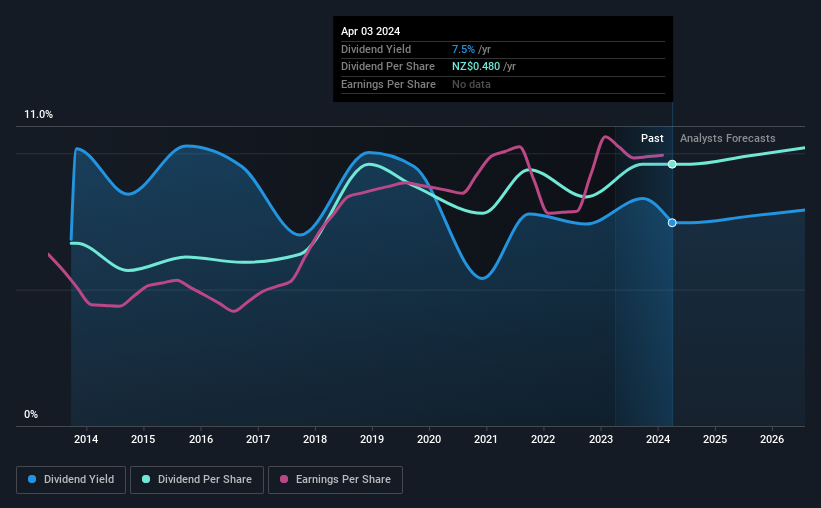Hallenstein Glasson Holdings' (NZSE:HLG) Dividend Will Be NZ$0.259
The board of Hallenstein Glasson Holdings Limited (NZSE:HLG) has announced that it will pay a dividend of NZ$0.259 per share on the 18th of April. This payment means that the dividend yield will be 7.5%, which is around the industry average.
See our latest analysis for Hallenstein Glasson Holdings
Hallenstein Glasson Holdings Is Paying Out More Than It Is Earning
Solid dividend yields are great, but they only really help us if the payment is sustainable. Prior to this announcement, Hallenstein Glasson Holdings' dividend made up quite a large proportion of earnings but only 46% of free cash flows. In general, cash flows are more important than earnings, so we are comfortable that the dividend will be sustainable going forward, especially with so much cash left over for reinvestment.
Earnings per share is forecast to rise by 2.3% over the next year. If the dividend continues on its recent course, the payout ratio in 12 months could be 100%, which is a bit high and could start applying pressure to the balance sheet.
Hallenstein Glasson Holdings Has A Solid Track Record
Even over a long history of paying dividends, the company's distributions have been remarkably stable. The dividend has gone from an annual total of NZ$0.335 in 2014 to the most recent total annual payment of NZ$0.48. This implies that the company grew its distributions at a yearly rate of about 3.7% over that duration. Although we can't deny that the dividend has been remarkably stable in the past, the growth has been pretty muted.
Hallenstein Glasson Holdings May Find It Hard To Grow The Dividend
The company's investors will be pleased to have been receiving dividend income for some time. Earnings per share has been crawling upwards at 2.8% per year. Hallenstein Glasson Holdings' earnings per share has barely grown, which is not ideal - perhaps this is why the company pays out the majority of its earnings to shareholders. This isn't the end of the world, but for investors looking for strong dividend growth they may want to look elsewhere.
Our Thoughts On Hallenstein Glasson Holdings' Dividend
Overall, it's nice to see a consistent dividend payment, but we think that longer term, the current level of payment might be unsustainable. The company is generating plenty of cash, but we still think the dividend is a bit high for comfort. We would probably look elsewhere for an income investment.
Companies possessing a stable dividend policy will likely enjoy greater investor interest than those suffering from a more inconsistent approach. Meanwhile, despite the importance of dividend payments, they are not the only factors our readers should know when assessing a company. For instance, we've picked out 1 warning sign for Hallenstein Glasson Holdings that investors should take into consideration. Is Hallenstein Glasson Holdings not quite the opportunity you were looking for? Why not check out our selection of top dividend stocks.
Have feedback on this article? Concerned about the content? Get in touch with us directly. Alternatively, email editorial-team (at) simplywallst.com.
This article by Simply Wall St is general in nature. We provide commentary based on historical data and analyst forecasts only using an unbiased methodology and our articles are not intended to be financial advice. It does not constitute a recommendation to buy or sell any stock, and does not take account of your objectives, or your financial situation. We aim to bring you long-term focused analysis driven by fundamental data. Note that our analysis may not factor in the latest price-sensitive company announcements or qualitative material. Simply Wall St has no position in any stocks mentioned.

 Yahoo Finance
Yahoo Finance 
